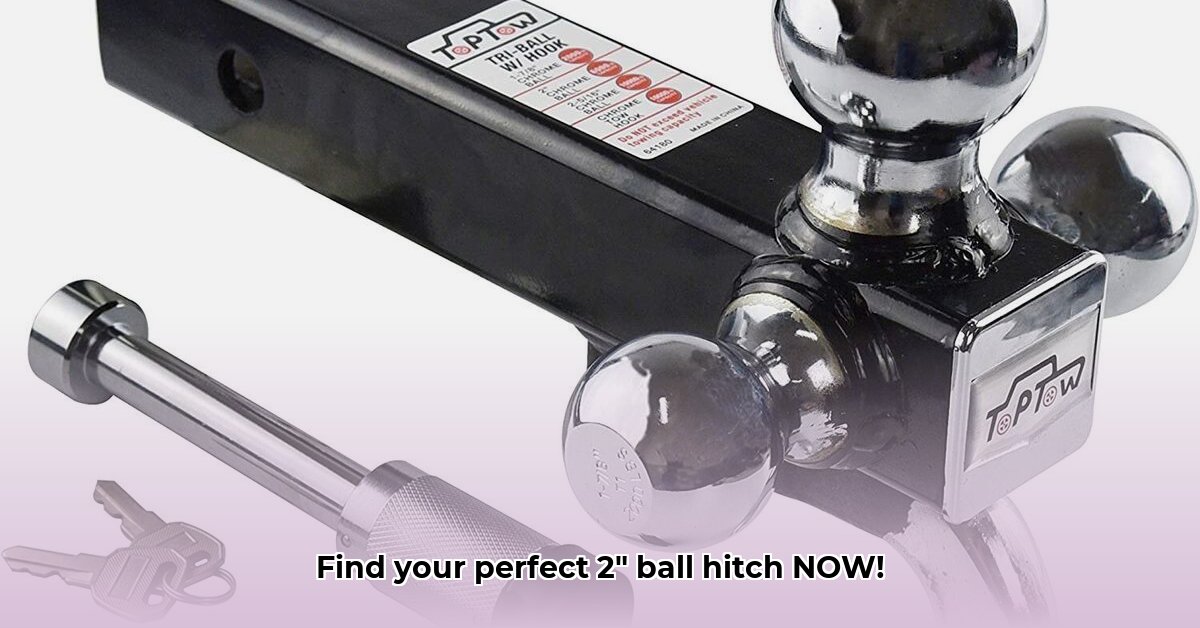
Choosing the right 2-inch ball hitch is crucial for safe and efficient towing, particularly in agricultural settings where heavy loads are common. This guide provides a comprehensive walkthrough, from understanding your towing needs to proper installation and maintenance, ensuring you're equipped to handle any task safely and effectively with your Tractor Supply purchase. For more detailed information on hitch receivers, see this helpful resource: Hitch Receiver Guide.
Understanding Your Towing Needs: A Foundation for Safe Towing
Before selecting a hitch, meticulously assess your towing requirements. What will you be hauling? The weight of your fully loaded trailer—including equipment, livestock, or harvested goods—directly impacts the hitch's necessary strength. Don't estimate; accurately weigh your trailer and contents using a scale to prevent potential accidents. This precise weight measurement is paramount in choosing an appropriately rated hitch. What's the heaviest load you anticipate hauling? Failing to accurately assess this could have dangerous consequences.
Decoding the 2-Inch Ball Hitch: Strength for Heavy-Duty Loads
The "2-inch" designation refers to the ball's diameter. A larger ball diameter signifies a stronger hitch, ideally suited for heavier loads frequently encountered in agricultural and heavy-duty applications. However, ball size alone doesn't guarantee safety; the hitch's overall construction and weight rating remain critical factors. Think of it like this: a larger hammer doesn't automatically deliver better results if poorly made. The quality of materials and the manufacturing process are key determining factors in a hitch's strength and durability.
Key Features: Essential Considerations for Your Hitch Selection
Several key features distinguish a superior 2-inch ball hitch:
Weight Capacity: This is the most crucial factor. The hitch's weight capacity must exceed your maximum towing weight. Exceeding this limit is exceptionally dangerous. Remember to also verify your vehicle's towing capacity in your owner's manual; the vehicle's limit should never be exceeded.
Material: Forged steel is generally the preferred material for its strength and durability. A zinc or chrome coating offers added protection against rust and corrosion, especially in harsh conditions. Rust significantly weakens the metal, compromising safety.
Shank Length and Diameter: The shank is the portion inserted into your vehicle's receiver. Precise matching of shank length and diameter ensures a secure fit. An ill-fitting hitch compromises stability and safety; a secure fit is essential.
Safety Features: Consider hitches with locking pins or clips to prevent accidental detachment. These features provide an extra layer of safety.
Choosing Your Hitch at Tractor Supply: A Step-by-Step Approach
Selecting the correct hitch at Tractor Supply involves a methodical approach:
Precise Weight Measurement: Accurately weigh your heaviest anticipated load. Underestimation is risky.
Vehicle Capability Check: Consult your vehicle's owner's manual to verify its towing capacity. Exceeding this limit is unsafe and potentially illegal.
Hitch Selection: Choose a hitch with a weight capacity considerably higher than your maximum load, incorporating a safety margin.
Shank Dimension Verification: Carefully match the shank's length and diameter to your receiver hitch for a snug fit.
Pre-Installation Inspection: Before installation, thoroughly inspect the hitch for damage, cracks, or defects. Replacing a faulty hitch is far less costly than repairing accident-related damage.
Installing Your Hitch: A Crucial Process
Installing a 2-inch ball hitch is generally straightforward, but safety precautions are paramount:
Secure Insertion: Carefully insert the hitch ball into your vehicle's receiver ensuring a smooth and complete insertion.
Secure Fastening: Use the appropriate cotter pin or locking mechanism to secure the hitch; using improper parts is a serious risk.
Final Verification: Double-check the hitch's secure attachment and the locking mechanism's integrity. Any movement could be catastrophic.
Maintaining Your Hitch: Ensuring Long-Term Performance
Regular maintenance prolongs your hitch's lifespan and ensures its safe operation:
Visual Inspection: Before each use, visually inspect the hitch for cracks, bends, or corrosion. Address any issues immediately.
Cleaning: Periodically clean the hitch to remove dirt and debris. A clean hitch is a safer one.
Lubrication: Apply a high-quality lubricant to the hitch ball and receiver to minimize friction and wear.
Tightening: Regularly check and tighten all bolts and connections to maintain security and stability.
Safety First: Never Compromise
Safe towing practices are crucial. Always operate within the weight limits of both your hitch and your vehicle. Regular maintenance, combined with a properly chosen and installed 2-inch ball hitch from Tractor Supply, ensures safe and reliable towing. If unsure about any aspect, consult a professional. Safety should never be compromised.